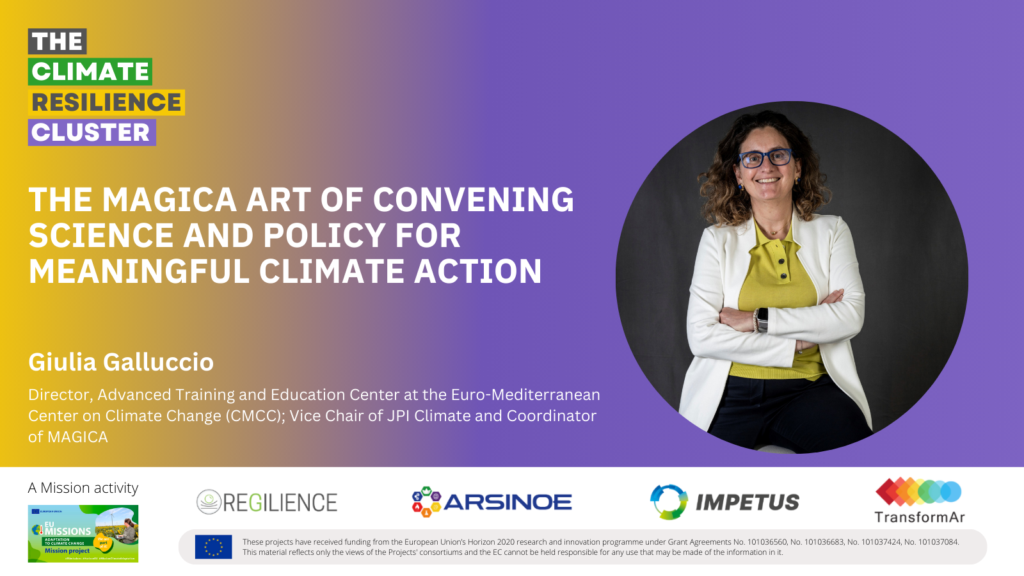
The best climate research in the world is worth nothing if it does not reach the ears of those who can put it to work.
Climate science must be actionable, understandable in terms that non-specialists recognise and can access – and that is what MAGICA exists to do. It operates at the heart of JPI Climate’s strategic priority of accelerating the development and transfer of knowledge from science to policy and practice within the European Research Area (ERA).
MAGICA stands for ‘MAximising the synergy of European research Governance and Innovation for Climate Action’ and it is a four-year Coordination and Support Action funded by Horizon Europe. It is an exciting collaboration of 23 partners across 13 countries whose skills cover the breadth and depth of the complex climate adaptation research-to-meaningful-action chain.
MAGICA hosts a busy arena of dialogue between the scientific community, policy decision-makers and influencers, climate practitioners and science communicators, facilitated by a dynamic and complementary series of events targeted at a range of critical climate adaptation audiences, the largest of which is ECCA – the bi-annual European Climate Change Adaptation Conference. Its 7th edition takes place this summer, June 16-18, in Rimini, Italy, with the theme ‘Smarter, Faster and More Systemic Adaptation’.
True to the ethos of JPI Climate and MAGICA, ECCA2025 puts ground-level involvement of its audiences and stakeholders at the heart of the conference – starting with the programme and advisory committees and policy board.
This coming together face-to-face, in an atmosphere of willingness to exchange, hear, challenge and debate – with confidence in being heard – is key to MAGICA. The success of our events, including ECCA2023, lies in the informal spaces between programme or agenda items, as much as in the excellent quality and range of content. From youth voices to song and performance, ECCA is an inclusive platform, embracing the roles of social sciences and the arts in unlocking communications channels and engagement for behaviour change. All these pivots round the central point of Europe’s highest quality climate science.
ECCA is an integral part of the Equinox Process, an initiative by JPI Climate and supported by MAGICA to accelerate mechanisms to enhance the transfer of climate knowledge from research to policy and action, addressing gaps in accessibility and utilization of climate science outcomes through high-level, invitation-only Equinox Summits. The high-level sessions have already convened ministers and senior officials from across Europe, IPCC working group co-chairs, leading researchers and key users of climate knowledge, discussing accelerating the transfer of climate knowledge to policy.
Whereas ECCA has become established as the forum for dialogue on climate adaptation, Equinox also regularly convenes science policy actors on climate mitigation and a new event, the Climate Neutrality Forum, has provided a meeting and knowledge-sharing platform for leaders in policy, science and industry who are steering Europe towards climate neutrality convened in Brussels. The programme was a carefully curated balance of science-led and policy-led panels, presentations and open discussions. When each session closed the conversations carried on, with policy decision-makers able to drill down into how research can support them in implementing impactful change to protect society, the economy and the environment from the effects of climate change. In turn they were able to set before scientists the practical policy needs they have to meet when championing and implementing climate adaptation measures.
The insights from these robust discussions were taken to COP29 in Azerbaijan by MAGICA and JPI Climate to inform the global climate adaptation agenda, as were the outcomes of the 1st Assessment Report on Sea Level Rise, a collaboration between JPI Oceans and JPI Climate. This report is the result of the Sea Level Rise Knowledge Hub (KH-SLR), a joint initiative of JPI Climate and JPI Oceans and key component of the Equinox Process. The report was published in 2024 with an online launch as well as being highlighted at a series of externally-organised events which shared the same target audiences. By now you will be getting the hang of the way MAGICA operates and you will not be surprised to learn that, again, stakeholders were at the heart of this report which was very well received across the policy and scientific communities.
It synthesizes current scientific knowledge on sea level rise and its impacts across local, national and European basin scales, to support evidence-based policy and decision making, primarily targeting coastal areas. The preparation took an interdisciplinary approach in assessing state-of-the-art information, not only consolidating existing knowledge but, crucially, identifying gaps in available knowledge. It was a collaboration of nine countries, and around 60 scientific and non-scientific European experts from a variety of backgrounds.
If, like me, you are an experienced actor in the climate adaptation research-to-meaningful-action chain you will recognise that MAGICA is working to break down many of the barriers that have long frustrated us. We aim to create a reliable and trusted pathway to steer scientific research into effective climate action. But don’t just take my word for it, join us at ECCA2025 – I look forward to seeing you in Rimini in June!
Registration is open for ECCA2025 with early bird prices available until April 18. Book your place here.
Hear about MAGICA events, news and updates, follow us on LinkedIn.
You can download the full article here.